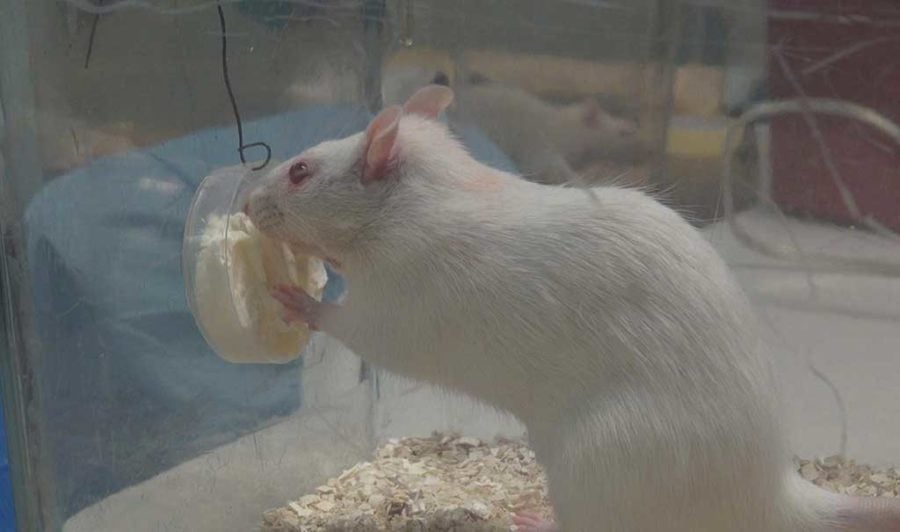Two strains of rats, cans of vanilla frosting and a theory have helped MSU professor of psychology Kelly Klump take one step closer to finding the genetic causes, and eventually a treatment, for binge eating.
In her latest research, Klump decided to use rats to help identify different biological and genetic factors that contribute to binge eating.
“Based upon our previous research, we know that binge eating is influenced by genes, but we have been unable to identify in humans which genes contribute to binge eating. With this research, we decided to study two different strains of rats instead of humans,” Klump said. “Unlike humans, animals do not have the cultural, psychological or psychosocial risk factors for binge eating, so they are simpler to study. A rat could care less what it looks like.”
Klump and her team studied two different strains of rats – Sprague-Dawley and Wistar rats – to determine if one strain was prone to binge eating. For two weeks, Klump and colleagues ran a feeding experiment with 30 Sprague-Dawley female rats and 23 Wistar rats. The rats were given their usual meal of “chow” (like chicken and vegetables for humans) and intermittently, vanilla frosting.
“We only gave the rats the vanilla frosting every other day because that mimics human binge eating habits,” said Britny Hildebrandt, a graduate student in the Klump lab.
And why vanilla frosting? “People don’t binge on lettuce or meat, they binge on sweets for the most part,” Klump said.
What Klump and her team found was that the rate of binge eating on vanilla frosting was much higher in Sprague-Dawley female rats.
“Now that we know that the Sprague-Dawley rats are prone to binge eating, this helps narrow the scope of the thousands of possible genes that could contribute to this disorder,” Klump said.
“We can now study the strain to identify the genes that might contribute to the disease. From there, we can map these genes in humans. If we can narrow down to 20 or so genes, then we are one step closer to finding an effective treatment for binge eating.”
Klump has been on a quest for more than 20 years to find the cause of binge eating and eventually a treatment. Binge eating is one of the core symptoms of most eating disorders, including bulimia nervosa and the binge/purge subtype of anorexia.
Females are primarily effected by eating disorders with a ratio of only one male for every ten women. These disorders can last for years. During this timeframe, effective treatment is critical since eating disorders have the highest mortality rate of any psychiatric disorder. And if it doesn’t kill, the damage it wreaks can be irreversible, according to Klump.
“Women with eating disorders suffer tremendously and deserve to have this on our national agenda with funding for continued research,” Klump said. “For far too long, people have thought that females with eating disorders are just vain girls who want to be pretty. Eating disorders deserve the same level of attention, treatment resources, and funding as other disorders, like schizophrenia and bipolar disorder. No one would say someone is schizophrenic because they just want to think interesting thoughts.”
The study is published online in Physiology & Behavior, the official journal of the International Behavioral Neuroscience Society. Klump’s co-authors are Cheryl Sisk, MSU psychology professor, graduate student Britny Hildebrandt; and Sarah Racine, a postdoctoral research fellow at the University of Pittsburgh.


Binge eating tends to be the main relief for stress, heartache and depression these days and even though most causes tend to be environmentally, this study excludes these environmental factor and focus’ on only the genetic part of the theory, quite fitting due to the fact that science is proving genetic determinism to be a validated theory. by cutting out the psychological factors this study tends to be quite effective by controlling most of the circumstances so only one factor (the genetic factor) can be studied. the use of the rats are also quite a great choice due to the fact that their brain chemistry is quite close to the human brain’s. I just don’t understand why an equal number of rats, from both species, is not used, wouldn’t it make sense to use equal numbers of both species so that the results can be more accurately compared?
The fact that the gene for binge eating can be narrowed down to roughly 20 shows that science is evolving quite rapidly and getting very close to finding a solution to a common problem. it’s quite critical that a solution be found, for binge eating is the main cause for obesity which leads to problems like type 2 diabetes, high blood pressure and high cholesterol levels which can lead to serious problems like heart attacks. This study could ultimately stop all those illnesses from kicking in, ultimately stopping the spread of it, and as the English saying goes “prevention is better tan cure”. This could ultimately lead to a better lifestyle, life quality and the saving of a lot of money, currently going towards medication and hospital care. This study can also teach people how to work with their genes to improve their health.
u14038855: This article is extremely interesting. I think it is good that studies are being done to try find the cause of binge eating which will then help people who suffer from binge eating and the diseases that go along with it. I find it intriguing that the experiment used rats and that they could relate the results of the experiments to humans. I really i hope they find the gene responsible for binge eating so that people that binge eat and suffer from diseases like bulimia can be helped. I also hope that the rats are still being well looked after.